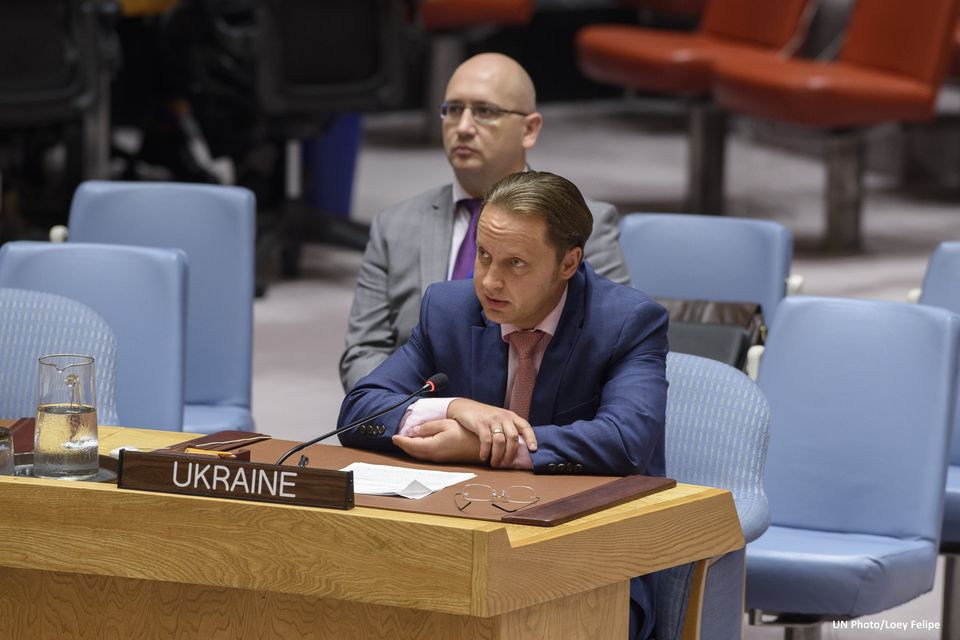Виступ делегації України на відкритих дебатах РБ ООН щодо посередництва та врегулювання спорів

As prepared. Check against delivery.
Mr. President,
Ukraine aligns itself with the statement to be delivered by the European Union.
I will also make a few remarks in the national capacity.
Let me begin by congratulating the delegation of the United Kingdom and you personally with fulfilling the duties of the Presidency in an exemplary manner.
I would also like to express our appreciation for your initiative to convene today’s discussion on mediation, which is the subject of a particular importance for my delegation.
As a country countering military aggression from its eastern neighbor, Ukraine firmly believes in the need to strengthen UN capacities in the mediation sphere, as well as to increase efficiency of the Organization’s respective efforts at all stages of the conflict cycle.
In light of the Security Council’s primary task to maintain international peace and security, we share the view that mediation activities can and should contribute a great deal to reducing and eliminating threats to global peace and security.
They are an important tool in preventing conflicts, building up trust and confidence between parties of a conflict, reaching peaceful solutions and consolidating peace agreements.
There is no doubt that the United Nations as a universal body enjoying the unique level of legitimacy has to play as active role as possible in preventing potential conflicts and addressing ongoing ones. As the previous Secretary-General stated in the report on the UN and conflict prevention back in 2015 (and I quote) «while the Member States bear the primary responsibility for conflict prevention, the United Nations, with its universal membership, impartiality and the legitimacy derived from the principles of the Charter, has an important and unique role to play» (end of quote).
Yet, as some previous speakers rightly noted, the UN’s potential is not being used to the fullest here.
There are always justifications for why the UN does or does not do something. However, those reasons do not in any way absolve the UN from its responsibilities.
Thus, people all over the world – including in Ukraine – continue look up to the UN with hopes and expectations that it will step up its efforts to prevent armed conflicts between states, and to ensure universal compliance with international law.
Mr. President,
We note with regret the UN’s and this Council’s inability to act properly and robustly on the fact of the blatant violation of Ukraine’s sovereignty and territorial integrity. As a result, the Russian Federation’s aggression against Ukraine continues unabating for the fifth year.
It is exactly today that four years ago regular armed forces of the Russian Federation directly attacked Ukrainian military units near Ilovaisk, which is deep into Ukrainian sovereign territory. This yet another act of aggression resulted in a treacherous massacre of 366 Ukrainian soldiers – despite a negotiated safe passage agreement with the Russian side.
On this tragic occasion and with your indulgence, Mr President, I would like to commemorate Ukrainians who sacrificed their lives in Ilovaisk and other battlefields in defense of their land and democratic values.
As Ukraine mourns its heroes today, we want this tragedy to serve as yet another reminder and warning – to this Council and beyond – of how worthless any deals and compromises with Moscow are.
Still, Ukraine remains committed to a peaceful resolution of this conflict. We proceed from the fact that Article 33 of the UN Charter envisages an obligation to settle any international disputes peacefully and provides a toolkit to do so.
In particular, we initiated proceedings in the International Court of Justice concerning the Application of the International Conventions for the Suppression of the Financing of Terrorism and Elimination of All Forms of Racial Discrimination.
We lodged the declarations pursuant to article 12(3) of the Rome Statute to enable the International Criminal Court to exercise its jurisdiction over war crimes committed since the beginning of the military aggression against Ukraine.
Earlier this year we filed the Memorial in arbitration proceedings against the Russian Federation under the 1982 United Nations Convention on the Law of the Sea, since Russia keeps violating Ukraine’s sovereign rights in the Black Sea, Sea of Azov, and Kerch Strait.
Together with other members of the Joint Investigation Team we continue working to ensure accountability for the downing of Malaysia Airlines flight MH17.
All in all, we consider negotiations as a “go to” method of settlement of disputes. Before lodging all the above cases in various international judicial organs, we exhausted all venues of negotiations at all levels.
Mr. President,
In closing, my delegation strongly believes that empowering and strengthening of existing international legal tools for peaceful settlement of disputes between states should be among the international community priorities.
In this context a more proactive approach to mediation on the part of the UN is needed.
By shying away from the issues considered too hot or sensitive, the UN is doing nothing less than undermining its own standing.
When it comes to our region, we were encouraged by the fact that the Secretary-General has identified settlement of European conflicts as one of his priorities for 2018. Now we are looking forward to a concrete follow-through here, with article 99 being used by the Secretary-General to the fullest – in the first place in relation to the Russian-Ukrainian armed conflict.
Finally, it is a total commitment to contribute to conflict resolution, combined with a conscious decision to uncompromisingly persevere in pursuit of a peaceful settlement, that will further strengthen the UN’s moral authority, and make it a more resilient organization.
I thank you.
